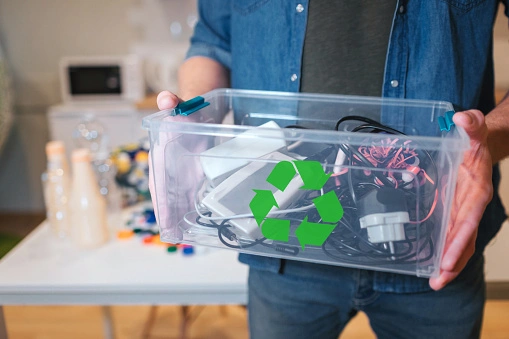
In our rapidly digitizing world, electronic waste, or e-waste, has emerged as a significant challenge. With millions of tons of outdated or broken electronic devices disposed of yearly, the need for effective waste recycling has never been more urgent. This critical process offers a pathway to not only mitigating the adverse environmental impacts of our digital age but also advancing sustainable development.
Environmental Benefits of E-Waste Recycling
One of the most compelling reasons to recycle e-waste is its potential to substantially lessen environmental degradation. E-waste contains hazardous substances, including lead, mercury, and cadmium, which can leach into soil and water, causing severe pollution. Proper recycling of e-waste ensures these toxic materials safely managed, significantly reducing environmental contamination. Furthermore, e-waste recycling conserves natural resources. Valuable materials like gold, silver, copper, rare metals can be recovered and reused, diminishing the need to extract raw materials from the Earth. This not only preserves the natural landscape but also reduces the energy consumption associated with mining and processing new materials.
Economic Advantages
Beyond its environmental implications, e-waste recycling presents notable economic benefits. It creates job opportunities in collection, sorting, processing, and recycling operations, contributing to local economies. Moreover, by embracing a circular economy model, e-waste recycling promotes the reuse of materials, enhancing resource efficiency and fostering innovation in recycling technologies. This approach not only supports sustainable economic growth but also helps companies and consumers save money by reducing the costs associated with raw material procurement and waste management.
Health and Safety Improvements
The health benefits of e-waste recycling can not be overstated. Proper handling and processing of e-waste protect workers and the general public from exposure to harmful substances. Additionally, by preventing environmental contamination, e-waste recycling contributes to cleaner air and water, directly benefiting community health and well-being. These improvements are crucial for enhancing the quality of life in areas heavily impacted by electronic waste.
Challenges in Recycling
Despite its numerous benefits, e-waste recycling faces significant hurdles. A major challenge is the lack of awareness and infrastructure for proper e-waste management in many parts of the world. Many consumers are unaware of how to dispose of their electronic devices responsibly, and in some regions, recycling facilities are scarce or non-existent. Additionally, the recycling process itself can be complex and costly, requiring sophisticated technology to effectively recover and reuse materials from a wide variety of electronic products.
Role in Sustainable Development Goals (SDGs)
E-waste recycling intrinsically linked to several United Nations Sustainable Development Goals (SDGs), particularly those related to responsible consumption and production (SDG 12), industry, innovation, and infrastructure (SDG 9), and good health and well-being (SDG 3). By reducing waste and pollution, conserving resources, and fostering economic growth through job creation and innovation, ewaste recycling contributes to a more sustainable and equitable world.
Moving Forward
Addressing the e-waste challenge requires concerted efforts from individuals, businesses, and governments worldwide. Increased investment in recycling infrastructure, stronger regulations on e-waste management, and public education campaigns are essential to enhance recycling rates and minimize the environmental impact of electronic waste. Additionally, manufacturers can contribute by designing products that are easier to recycle and by taking greater responsibility for the end-of-life management of their products.
Conclusion
E-waste recycling stands at the crossroads of environmental conservation, economic opportunity, and public health. As the volume of electronic waste continues to grow, the role of recycling in sustainable development becomes increasingly critical. By embracing and promoting e-waste recycling, we can protect our planet, stimulate our economies, and improve our quality of life. The path to a more sustainable future requires collective action and commitment to responsible e-waste management practices.

